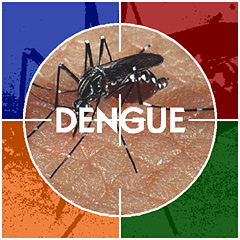
|  |  |  Health & Beauty Health & Beauty  
1st 2010 Dengue Related Death in Vallarta
 PVNN PVNN
June 07, 2010


| |  |
Dengue, a flu-like viral disease spread by the bite of infected mosquitoes, is on the march again, and beginning to make its presence felt in the Mexican state of Jalisco. The Jalisco State Health Department recently confirmed that out of the 13 dengue-related deaths that have been registered nationally in 2010, one was a 50 year-old woman from Puerto Vallarta.

In a recent Guadalajara Reporter article, Tom Marshall reported:

| The first dengue-related death of 2010 in Jalisco has been confirmed by the state Health Department. "She was a adult female aged about 50 from Puerto Vallarta," Health Secretary Alfonso Petersen announced this week. "Its one of the 13 deaths that have been registered nationally."

Petersen added that a person from Cihuatlan, Jalisco may have also died from dengue and the results of tests are being awaited.

The news comes as a reminder that a large part of the country is entering the period of the year when dengue cases tend to rise steeply.

This week, representatives from federal, state and municipal governments signed a pact to work together to educate people about the causes, symptoms and ways of reducing the risk of dengue.

Jalisco Governor Emilio Gonzalez warned of the dangers of standing water in or near houses where the dengue-carrying Aedes aegypti mosquito likes to lay eggs.

"The only documented way of effectively controlling the vector is to work to eliminate areas that have the right conditions for mosquitoes," said Gonzalez. "The World Health Organization said it, not us. The key actions are: wash, cover, turnover and throw away. The principle is simple: without the right conditions there is no larva, without larva there is no mosquito and without mosquitoes there is no dengue."

Teams of fumigators will again be trawling urban areas in the state to fumigate houses, and the state government is pleading for people to let them in.

Gonzalez also raised an additional problem concerning unoccupied houses.

"The biggest problem we have is with houses that are closed up," he continued. "They make up 21 percent or, in other words, roughly one in every five houses has no-one inside. Nobody can know whether water is accumulating there or not, and of course that is a risk for everyone."

In 2009, 48 people from Jalisco died from dengue, according to national statistics. |

Dengue is one of the most common viral diseases spread to humans by mosquitoes in tropical countries around the world. Here in the Banderas Bay area, after undertaking intensive insect control measures, local public health authorities say that the Dengue risk in tourist areas within Puerto Vallarta is considered to be low.

 However, the fact that dengue cases are being reported makes it clear that we all have to participate in the fight against this disease. Using personal protective measures to avoid being bitten by an infected mosquito remains the only sure means of reducing your risk of exposure to the dengue virus. However, the fact that dengue cases are being reported makes it clear that we all have to participate in the fight against this disease. Using personal protective measures to avoid being bitten by an infected mosquito remains the only sure means of reducing your risk of exposure to the dengue virus.

Here are some things that you can do to help eliminate mosquito breeding in areas where dengue might occur:

First, we all have to ensure our patios and gardens are clean. This includes making sure that there is no standing water in, or under, the pots of your plants.

The mosquito is reproducing in clean water, therefore you should have no dish where there is water accumulation. In Mexico, the "lavabo," a washbasin found inside the service/washing room is often a place where there is an accumulation of water.

Fumigation by the Jalisco Department of Health will only work by eradicating mosquito breeding sources inside and outside of the houses, so if you hear the fumigation trucks in your neighborhood in the morning or at night, you should open your windows and doors.

When possible, remain in well-screened or completely enclosed, air-conditioned areas. When outdoors, wear light-colored clothing with full-length pant legs and sleeves and use DEET-based products as repellents on exposed skin.

Please remember - to be informed does not mean to be in a panic, but to be conscious there is a problem. By working together we can all make a difference and protect our families. However, if you do get sick, please get the appropriate medical assistance and don't forget that these cases must be reported. |

 |
|  |



